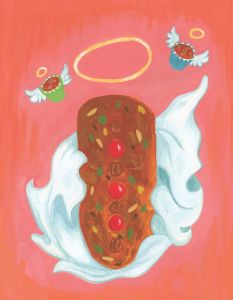December 21, 2014
It’s December 17, eight days before Christmas, and I’ve got a lot of fruitcake to offload as I work my way down a list of potential beneficiaries. Carol, an editor I’ve known for decades since working with her at a Bay Area newspaper, is acting coy. Yes, she’d like a sampler, the Three Generations of Fruitcakes project I’ve produced this year, including my grandmother’s from the recipe found in the box; my mother’s tweaked variation, also in said box; and my own darker, richer fruitcake, far different from theirs, which I’ve been developing longer than I’ve known Carol.
“Well, yes,” she demurs. “I love fruitcake, but I don’t want to deny the First Family one.”
Bingo! With that reference to Truman Capote’s autobiographical “A Christmas Memory,” in which a seven-year-old boy bakes fruitcakes with his elderly spinster cousin to send to a list of acquaintances and strangers, including the president of the United States, Franklin Roosevelt, Carol has secured her place on my roster. I’ve never sent a fruitcake to a president or a stranger or even a vague acquaintance just because I thought they might enjoy it, as Capote’s cousin Sook was in the habit of doing. My fruitcake has its following. The only problem is that I can’t remember all but the few nearest and dearest of them until I’ve baked a batch. Names start popping into the possibilities category as my anger rises, as it has been for days, at having to devote more time to the tedium of wrapping and shipping than I do to the actual, quite pleasurable, baking. But tedium is what it takes to get the little buggers out the door before Christmas.
One year I sent one to prison to the wild, but nice, rock ’n’ roll photographer friend who’d landed there for something to do with drugs and guns—it was the seventies and we were in California, after all. It’s not that I knew he liked fruitcakes as much as I felt that if I’d landed in jail I’d want someone to send me a fruitcake. Since I have been at heart a little old lady since I was a small child, I realize the likelihood of landing in jail is small, but I remain a highly empathetic little old lady. That was probably the most altruistic of my fruitcake lobbing efforts.
Through the years I have also sent fruitcakes to family members who were polite but fi rm in their wishes that I would not. My mother, who had long before given up “doing” Christmas, once suggested that I not send her another. “I’ve still got the one from last year in the refrigerator,” she informed me. I reluctantly dropped her permanently from my list.
Gifting was ostensibly the reason I fi rst began making fruitcakes. I was in college, strapped for cash, and the ingredients could be bought with food stamps. As Christmas fodder goes, fruitcakes are an affordable, one-size-fi ts-all item that when wrapped in paper and ribbon have suffi cient heft to impress anyone with the weight of the baker’s good intentions.
Now I bake them to keep from having to spend time shopping in crowded holiday malls or hours online playing bargain roulette. I’d much rather be tossing a half-ton of fruits and nuts into my grocery basket, like some crazed squirrel, than beating the bushes for a lot of useless gizmos to give the loved ones on my list.
Another primary reason for what constitutes my holiday ritual are that fruitcakes assured I would have a holiday, no matter who wasn’t around. I was like Ratso Rizzo crossing a busy street in Midnight Cowboy, shouting at the honking taxis “Hey, I’m having Christmas here!”
My Christmas cheek has been gifting people with the terrazzo-like loaves that look like early Christian reliquaries whether they wanted one or not. I’ve long persisted in giving them to the likes of my sister, who the same year my mother said she had last year’s in the fridge, assured that the previous year’s was still on her mantel. We were going through one of our intermittent estrangements, for which I considered fruitcakes my form of friendly fi re. When we are going through one of our warm spells, her reactions to my fruitcake go from polite taunts that she get one to demanding that I bake them commercially.
The cakes may historically represent the harvest of a fruitful year, but for me their baking reveals a small circle of tender fruitcake hearts connected through their fruitcake cravings, struggling to maintain their fruitcake fondness amidst the larger fruitcake laughter.
When I first met the man I would marry, I turned down a date with him because, I explained, I was spending the weekend baking fruitcakes. I was pulling myself together after a rough patch and fruitcakes were a necessary, grounding part of the plan. Fruitcakes, he later told me, were something his beloved grandmother had made, and my excuse hit a primal nerve. We have been married somewhere between twenty-fi ve and one hundred twenty-fi ve years, and while there has been the occasional, fl eeting contemplation of divorce, the thought of finding anyone who loves my fruitcake as much as he does (he is the single largest per capita consumer) has always been one of the things that prevented the thought from going any further.
This year’s triple crown of fruitcake baking has resulted in thirtyseven pounds of fruitcake to dispose of. I have been showing up at appointments and social outings with samples in pockets and briefcase, merrily wrapped trios of cupcake-sized offerings and mini loaves representing my family’s three fruitcake generations. I consider the mother/grandmother duet as having historical value as well as providing a baseline from which to appreciate my updated effort.
I may be semi-autistic when it comes to most social cues, but I know just how far to push a fruitcake offer. If the words fruit followed by cake are greeted with a crumpled expression I change the subject. If eyes widen, even slightly, and a mouth shifts into a thoughtful, firm stance, I will advance the investigation in hopes of determining exactly how much fruitcake the person can take, from cupcake to mini loaf to major loaf, half or whole. Faint-hearts need not apply: If the response to “do you like fruitcake?” is a sputtered “I don’t know, I guess I could give it a try,” don’t worry, I won’t burden you further. So when Carol references the Capote story, her fate is sealed. “I’ll be traveling,” she warns. “The package might be left on the porch for days.”
She doesn’t understand how little that matters to me. If you spend a week or more baking fruitcakes and fi nd yourself harboring a supply that now occupies a large chunk of your laundry room, caution has been thrown long ago to the heavily spiced winds.
(text continued in Compromise Cake: Lessons Learned From My Mother’s Recipe Box)

